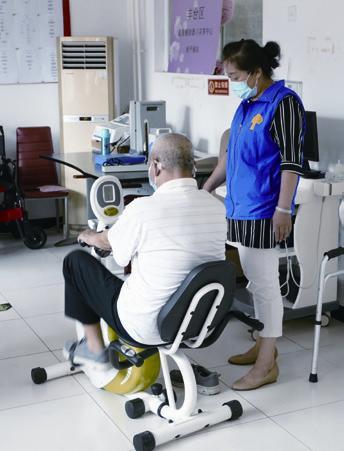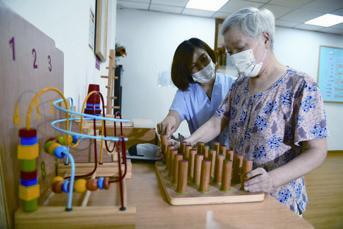Meeting Elderly Needs
2020-08-28ByLiXiaoyu
By Li Xiaoyu

People aged 60 and older now make up more than a sixth of Chinas total population and there are no signs of this fi gure slowing down in growth.
China had 249 million people on the plus side of 60 in 2018, according to a report by the C hinese Aging Well Association in May 2019. Of them, 40 million were dependent or semi-dependent on specialist care. However, there are only 300,000 professionals catering to this emerging market and the gap continues to widen.
It is therefore not surprising that geriatricians—primary care medical doctors specializing in the assessment and treatment of elderly people—appeared in the list of new occupation categories released by the M inistry of Human Resources and Social Security (MHRSS) this July.
Services catering to the needs of the elderly are clearly in great demand in China, both right now and in the foreseeable future.
Question time
In a nursing home in Huairou District, northeast Beijing, Liu Qin, a geriatrician, is working in a small, well-equipped assessment room.
Pensioner Wang Lihe is getting ready for her assessment. “Can you brush your teeth on your own?” asks Liu.
“Yes of course,” says Wang, as she squeezes out the toothpaste, turns on the tap, grabs a glass of water, and gently puts the toothbrush in her mouth before moving it up and down. Despite moving slowly due to her age, she seems to do a good job. Liu awards her 10 points for her efforts.
“Wang, I will now say three words that you will repeat after me, and then again in a little while, ok? Lets start: apple, watch and flag.” Wang repeats the words easily. The geriatrician then hands her a sheet of paper and a pen, and asks her to draw a clock showing the hands at 10:45 a.m. While the clock face is not perfectly round, the hands show the correct time. “Fantastic!”says Liu, before asking if she can repeat the three words mentioned earlier. Wang thinks briefl y and then answers correctly. The geriatrician awards her 10 additional points on her assessment form for her good cognitive performance.
There are more than 20 such assessment tests. In addition to basic information(education level, marital status and sources of income), the geriatrician must be as precise and thorough as possible in order to write a report summarizing the patients daily routine, psychological state, perceptions, as well as communication and social skills.
Improved assessment
Whatever the care level, either at home or in a specialized institution, the first step is to go through a geriatric test to assess the patients dependency level and to determine a coordinated plan of medical support.
For example, totally care-dependent seniors cannot perform basic daily activities without the help of a caregiver, while mildly dependent individuals need only specific help, such as in washing and bathing.
This geriatric assessment process is extremely important both for the seniors and for their children, who are often concerned about the fi nancial aspect of care provision.“Costs are relative to the level of care and children prefer a lower level of dependency. Sometimes they argue with the medical team about this,” geriatrician Wei Xiaotong said.

She recalled a recent case of an octogenarian couple in the nursing home where she works. Following the assessment, she found that the wife was more dependent on care than her husband, who was in better health. Wei therefore recommended first-level care for the wife, a decision that the children opposed. “Our mother is still independent, and no matter what, our father is here and can still take care of her,” they argued.
The geriatrician complied with the childrens request. Two weeks later, however, their mother fell and fractured her leg. This incident made her children understand the importance of the geriatric assessment process, after which they asked that her level of care be upgraded.
S ought-after profession
Being a geriatrician requires multidisciplinary skills and a specific approach to medical care. Liu has been working in the elderly care sector for many years and she manages a retirement home, while Wei majored in geriatrics in university.
According to Liu, recognition of this new profession by the government will raise public awareness and encourage more qualifi ed professionals to apply for positions in this expanding sector. Wei is convinced that the governments decision will increase social recognition and that her profession will gain more credibility.
However, higher education is not keeping pace with these new developments. Only a handful of universities have included geriatrics in their curriculum. Private institutions and associations provide training and certificates, but no professional certification endorsed by MHRSS is available at the moment. In the future, job creation, adequate training provision and good professional practices will depend on this recognition.
